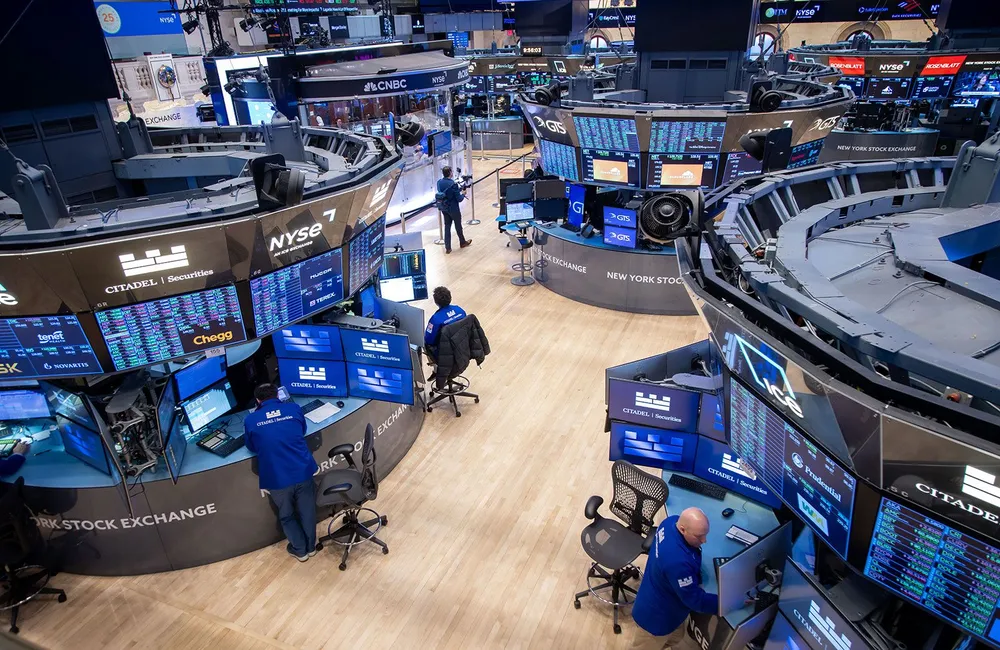As expected by the majority of investors, the US Federal Reserve announced on Wednesday a 0.5% increase in interest rates. The Fed also reaffirmed its intentions to keep raising rates in the coming year.
ASX futures were trading 56 points or 0.78pc lower at 7195 at 7:00am AEDT on Thursday to show a decline at the open.
U.S. stocks fell after the Federal Reserve hiked interest rates by 50 basis points as expected. The Fed also suggested that rates might have to rise even more than they’d thought to tamp down inflation.
At the end of a turbulent trading day, the S&P 500 was down 0.4 percent, while the tech-heavy Nasdaq Composite Index was down 0.6 percent. The Dow Jones Industrial Average fell 0.3 percent.
Investors had widely expected the Fed to announce it was lifting its main policy rate by half a percentage point. What they were less certain about going into Wednesday’s meeting was just how much higher Fed officials believe rates will need to rise next year.
Those who were hoping the Fed may have run out of room to raise rates anytime soon, however, might be disappointed. Fed officials indicated that rates would rise to about 5.1 percent by the end of next year, compared with a previous projection in September of about 4.6 percent.
Officials also said they expect unemployment to rise and for economic growth to be slow over 2023.
In commodity markets, Brent crude lifted 2.85% to $US 82.98 a barrel, while gold slipped 0.28% to US$1,805.77.
In the local bond markets, Australia’s 2 Year yield declined to 3.07 and the 10 Year yield dropped to 3.36. During the same period US 10 Year yields fell to approximately 3.49% while U.S. 2 Year Treasuries yielded 4.24% Overseas.
The Australian dollar was trading at 68.48 US cents, down from 68.55 at Thursday’s close. The Wall Street Journal Dollar Index, which measures the U.S. currency against 16 others, fell to 96.80.
Asia
China
Chinese stocks fell for a third straight day, retreating from the rally in the days immediately after Beijing cleared a raft of Covid-19 restrictions. Investors are awaiting an economic policy meeting of the country’s senior-most leaders later this week that will establish the policy tone and economic priorities for the year ahead. Telecom and biotechnology companies were among the biggest drags on the market, with China Unicom and Beijing Wantai Biological Pharmacy Enterprise falling 3.4 percent. Shares in consumer firms extended their gains with Shanghai Jahwa United climbing 3.8% and food producer Yihai Kerry Arawana advancing 3.6%. The Shanghai Composite Index ended flat. The Shenzhen Composite Index fell 0.1 percent and the ChiNext Price Index retreated by 0.3 percent.
Hong Kong
Stocks in Hong Kong closed in positive territory after a choppy day, with sentiment lifted by the ongoing reopening of the city. The benchmark Hang Seng Index gained 0.4% to close at 19673.45. Tech companies in Hong Kong, which some analysts say are still undervalued, were the best performers in this session. Shares in the internet and AI company Baidu gained 3.6 percent, and the gaming company NetEase rose 2.3 percent. The Hang Seng Tech Index ended 0.3% higher at 4237.66. Online health platforms sank, but a handful recouped some ground later in the day. JD Health fell 3.8% and Alibaba Health declined 7.1%.
Japan
Stocks in Japan finished higher, with electronics shares leading the way, as fears over U.S. inflation and aggressive tightening by the Fed abated. Lasertec jumped 3.4% and Tokyo Electron surged 1.9%. The Nikkei Stock Average added 0.7% to 28156.21.
Europe
European stocks finished mostly down, as investors awaited the US Federal Reserve latest policy decision. The Stoxx Europe 600 closed little changed, the FTSE 100 fell 0.1 percent, the DAX slipped 0.3, and the CAC 40 lost 0.2 percent. “There had been a concern in [the European session] that [Fed Chair Jerome] Powell may well push back on market expectations of a dovish pivot, in a bid to reset market optimism, and also put pressure on markets overnight,” wrote CMC Markets analyst Michael Hewson.
North America
U.S. stocks reversed direction after the Federal Reserve lifted interest rates by 50 basis points, in line with expectations. The Fed also indicated that rates may need to rise higher than previously thought in an effort to tame inflation.
After a volatile day of trading, the S&P 500 ended down 0.4 percent, and the tech-heavy Nasdaq Composite Index fell 0.6 percent. The Dow Jones Industrial Average dropped 0.3 percent.
Investors had widely expected the Fed to announce that it was raising its key policy rate by half a percentage point. What they were less confident of ahead of the Wednesday meeting was how much higher Fed officials believe interest rates will have to climb next year.
For anyone hoping the Fed may be close to hiking rates, they may have been disappointed. The Fed officials indicated that they now expect interest rates to rise to around 5.1 percent by the end of next year, compared with their previous estimates in September of around 4.6 percent.
Officials also said that they see unemployment rising and economic growth remaining tepid in 2023.
“We’re not in the clear yet,” said Viraj Patel, a global macro strategist at Vanda Research. “We’re still in a higher-than-normal inflation world.”
Investors also continued to express concern about the outlook for the economy and are expecting the run-up in borrowing costs to start constraining corporate profits and consumers in the months ahead.
“2023 is when you will begin to feel the impact of all these rate increases,” said Seema Shah, chief global strategist at Principal Asset Management. Numbers look like they are under a pretty good amount of pressure, however economic numbers are actually pretty resilient. We don’t believe that is going to be the case.”





















